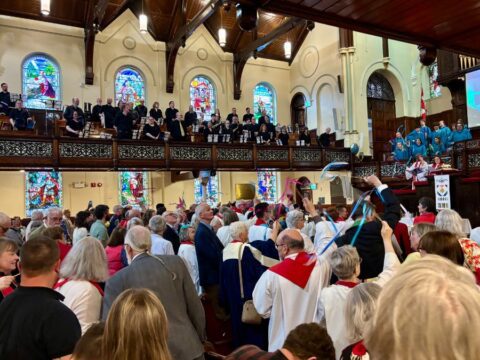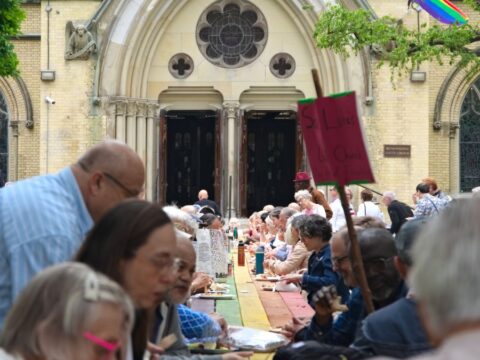On a recent spring morning, Rob Crew saw an unexpected car pull up to Sparrow Lake United Church Camp. It stopped, and an elderly gentleman emerged. His wife, he explained, who was still seated in the car, had advanced Alzheimer’s disease. Back in the 1930s, she was a frequent camper here and often talked about her camp days before she became ill. Would Crew mind if they walked around the property?
“She got out of the car with a big grin on her face,” says Crew, the camp’s executive director. “It brought tears to her husband’s eyes — for those moments, she knew who she was.”
Sparrow Lake, 100 acres of wooded lakefront near Orillia, Ont., celebrates a century of continuous camping this year. Crew credits the success of the camp to its strong sense of community.
Campers become the next generation of camp leaders before eventually sending their own kids. “Camping allows kids to grow in their faith,” he says. “When I was a teenager, I wasn’t in church on Sunday morning. Camp was my church. It’s a place where kids can explore and test out their faith.”
It’s a heartening image, but increasingly rare. Since 2005, the United Church has closed 12 of its 75 camps because of drops in attendance — a reality facing many camps, and not just church ones.
Saskatchewan Conference alone closed five camps: Outlook, Mewasinota, Starview, McKay and Wabimasquah. Longtime Saskatchewan camp volunteer George Thurlow says they’re struggling with several issues: rural depopulation, crumbling infrastructure, a lack of volunteers and competition for kids’ time. Falling disposable incomes also make camp fees a challenge for families.
“Our numbers slipped such that we could not operate full seasons, which impacted on how much work we could offer teenage counsellors,” notes Thurlow, a legal-aid lawyer. “In the camps which remain, I am noticing that there are major capital expenses. The dining halls, staff quarters and rec centres built in the 1950s . . . are worn out and need replacement. We are seeing cost estimates in the $250,000 to $500,000 area.”
In British Columbia Conference, two camps closed: Kwomais and Moorecroft. These closures were part of an intentional eight-year renewal project, Camp Futures, which ended last December. The Conference hired a consultant to assess its 10 camps, most of which were underused and in need of significant repairs.
Terry Harrison, a United Church theology student with a background in corporate planning and communications, advised selling three camps. “Selling is not an easy process; the heartache and letting go,” she says, noting that B.C.’s Rock Lake camp refused to be sold. “But in the end, it can be a good thing. I hope time tells that tale.”
The sale of Kwomais and Moorecroft raised $25 million, and $11 million of that is supporting rebuilds at Camp Fircom and Camp Pringle.
“Camp Futures wouldn’t have proceeded if camping weren’t a movement worth supporting,” says Harrison. “We heard so many stories: people falling in love; the first place someone felt accepted. There were so many profound, compelling stories. I certainly hope there’s a future for United Church camping.”
Indeed, so does the wider church, as well as the camps themselves. In 2010, General Council created the “We Are Camp!” resource package to help raise awareness about United Church camping — which still involves roughly 2,000 paid staff and 24,000 campers each year.
At Connections 2011, the annual gathering of United Church camping administrators, members voted to form a national association. The coordinating committee is set to report to General Council this spring, with a plan to build up United Church camps and push them into the future.
Still, “unless there is a dramatic shift either in how camps operate, or how the church supports its camps,” more camps are likely to close, says Darryl MacLeod, a member of the coordinating committee and executive director of B.C.’s Camp Pringle.
At Sparrow Lake, some of those sustainability-enhancing shifts have already happened. Crew, who teaches outdoor education for the Toronto District School Board, last year convinced the TDSB to give students a high school credit for a month-long, $2,000 camp leadership program. It was full within two days.
“Parents are willing to pay if they feel their kids are getting value,” Crew explains. If camps can match their off-season offerings to school curricula, school groups can become an important source of income.
As Harrison points out, however, Canada is becoming increasingly secular, which can be a disadvantage for camps with the word “church” in their names. In addition, Canada’s ethnic communities often have no background in summer camping, so you can’t depend on new Canadians to deliver new campers.
But last year, a local Presbytery gave money to send a group of 25 Ugandan refugee children to Sparrow Lake. For Crew, the successful integration of a new community into the camp was a milestone; camping is still largely an Anglo-Saxon pursuit, he says, and something that must change if camps wish to stay open in multicultural Canada.
If the hope is in new blood, that’s partially because traditional middle-classers have become “helicopter parents,” Crew says — afraid to let their kids out of their sight. “My parents couldn’t wait to get rid of me,” he recalls of his own days as a camper in the 1970s. “Now, parents don’t think their 10-year-old is ready to be away from them.”
Over-parenting, sadly, isn’t something camps can solve. Hopefully, camps will still be around when parents loosen the reins again and their disposable incomes rebound.
***
This story first appeared in The United Church Observer’s May 2012 issue with the title “Reinventing a summer rite.”














